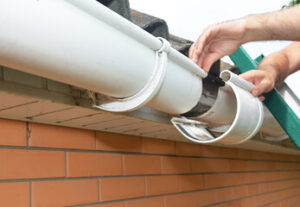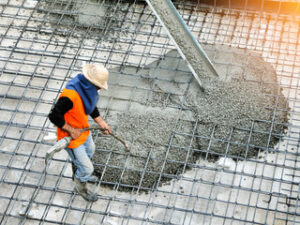Gutter Cleaning is the process of removing debris from your home’s gutters. It is typically done twice a year, in the spring and autumn, to keep your gutters unblocked and flowing correctly.

Gutter cleaning involves climbing a ladder and working with a trowel. You also need a hose for flushing the gutters. Visit https://www.stlouisguttercleaningservices.com/ to learn more.
Gutter cleaning is a crucial home maintenance activity that safeguards the integrity of your roof and walls. Clogged gutters overflow water and force it against the side of your house, causing moisture seepage and potentially leading to structural damage. Gutters that are properly maintained allow rainwater to flow freely, protecting the foundation of your home from water-related issues and preserving the beauty of your landscaping.
When gutters become clogged with leaves, twigs, dirt, shingle granules and other debris, it can lead to overflowing water that can damage your house’s siding and erode the soil around its foundation. This may also cause the foundation to crack, swell or sink, causing serious problems with your home’s structure and safety.
Clogged gutters provide a perfect environment for mosquitoes, rats, birds and other pests to thrive. These unwelcome guests can infest your home with dangerous diseases and pests that will harm your family’s health. Clogged gutters can also contaminate the water that flows through your home, exposing you and your family to harmful bacteria and other contaminants.
The primary function of a gutter system is to carry rainwater or snow/ice melt down to a drain or storm sewer line, diverting it away from the foundation of your home and into the landscape. However, if the gutters themselves are damaged or the downspout is blocked, your entire drainage system can be compromised, leaving you with costly and destructive side effects.
Gutter systems with curved or sagging sections can collect debris that cannot be removed by hand. If this debris is not cleaned out on a regular basis, the gutter will eventually sag and pull away from your house. In addition, sagging sections of the gutter can trap water and cause damage to your roof shingles.
Keeping your gutters clean is one of the easiest ways to protect your home. Gutter cleaning services are available to remove all of the dirt, debris and sludge from your gutters on a regular basis. In addition, professional services can install downspout extensions and diverters to keep your gutters clear of clogs, ensuring they are working as designed.
Prevents Mold and Mildew
A clogged gutter that holds water is a perfect place for mold and mildew to thrive. These fungi spread to the roof, fascia boards, and walls of your home, which can lead to major structural problems and expensive repairs. They also spread into the crawl space and basement, where they can trigger allergies and respiratory issues for anyone living in the house.
Gutter cleaning prevents these health risks by keeping the fungi from growing in the first place. It is recommended to clean your gutters twice a year: once in spring and again in autumn, when the plants are shedding their leaves and before the winter snows begin to fall.
Clogged gutters can cause water to back up under the shingles, which can damage your roof and potentially leak into your home’s interior. It can also rot the fascia and sag or detach from the house, causing expensive structural damage. Regular gutter cleaning ensures that water flows freely, reducing the risk of these problems and prolonging the life of your roof.
Standing water in clogged gutters is a breeding ground for mosquitoes and rodents, which can transmit diseases that can be dangerous to your family’s health. These pests love to nest in the damp, debris-filled environment, and they will continue to breed until the gutters are cleaned.
If you’re planning on cleaning your own gutters, make sure to wear gloves and use a stiff brush to scrape away the gunk. The rotting, moldy debris often contains bird, pigeon, and squirrel droppings that are rife with bacteria. Additionally, the scraping process may introduce rust spots to your steel gutters. It’s also best to work on a sunny day, as the grime can cause stains to form on your hands and clothing.
The main reason why you should clean your gutters is to protect your home from water damage and maintain the value of your property. Without gutters, rainwater would overflow and seep into your roof, walls, foundation, and interior. This can lead to costly repair and structural damage, as well as serious health problems. Gutter cleaning is an inexpensive and easy way to protect your home from water damage and keep it looking its best.
Prevents Pests
Pests like rodents, mosquitoes, and birds are drawn to clogged gutters. The leaves, twigs, and debris provide a perfect environment for them to nest and breed. Not only do these unwanted guests create costly problems for homeowners, but they can also carry disease-causing pathogens and spread them throughout living spaces.
Regular gutter cleaning prevents these pests from making a home in your rain gutters. Leaving them there will only encourage them to look for better, more inviting homes. Clogged gutters also attract carpenter ants and termites, which love the moist conditions inside. They can easily eat away the wood of your fascia boards and siding, creating serious structural issues for your house.
Gutter cleaning helps prevent bird-related problems as well. When you regularly remove the twigs and leaves that attract them, birds will find it less appealing to build their nests there. This will help reduce the number of birds that flock to your property and prevent the potential for them to cause damage.
Mosquitoes are another problem that can be prevented with gutter cleaning. They lay their eggs in stagnant water, which is what you will find when your gutters are clogged. Regular gutter cleaning will ensure that the standing water is minimal, deterring mosquitoes from laying their eggs there.
In addition, regularly cleaning your gutters will help keep weeds and plants from growing in them. The nutrient-rich material in clogged gutters is an ideal environment for weeds and flowers to grow, which can be a major hassle for homeowners once they’re fully grown.
If you’re looking for a way to reduce the amount of weeds and flowers in your gutters, consider installing gutter guards or using natural pest repellents. Lavender and marigolds are common natural pest repellents that can be planted in and around your gutters to discourage pests from nesting there. Organic sprays are also available, which you can use around your gutters to protect them from pests without putting the health of your family or pets at risk. Gutter guards will also make it much easier to clean your gutters, reducing the likelihood of clogs and other problems.
Prevents Structural Damage
Gutters play a vital role in directing rainwater away from your foundation and landscaping. However, if they become clogged with debris like leaves, twigs, and dirt, water can overflow and accumulate around your home, causing foundation damage and soil erosion. Regular gutter cleaning prevents this damage by ensuring that your gutters are free of obstructions and are working properly.
Clogged gutters are a breeding ground for rodents and other pests, such as termites, mosquitoes, ants, and rats. The organic trash in clogged gutters also breaks down, fostering the growth of fungus and weeds. The spores these plants produce can cause a variety of health issues, including respiratory problems and eye irritation.
In addition to preventing structural damage, routine gutter cleaning can help protect your home’s value and curb appeal. Aesthetics are often the first thing that homeowners consider when evaluating their home’s value. Clogged, overflowing gutters can create unsightly stains and streaks on the exterior of your home. Gutter cleaning removes these unsightly stains, maintaining your home’s appearance and boosting its curb appeal.
The benefits of regular gutter cleaning far outweigh the minimal cost associated with this task. Keeping your gutters clean is a crucial aspect of homeowner maintenance that can help you save money on costly repairs, and it can even increase the lifespan of your roof.
While it may be tempting to tackle your gutters yourself, a professional can provide you with a more thorough and efficient service. In addition, professionals are trained to safely and efficiently handle the work without damaging your gutters or roof shingles. Professionals are also well-equipped to address any problems or issues that may arise during the course of the job, minimizing downtime and potential complications. In addition, professionals can recommend any additional services, such as low pressure roof cleaning or sandblasting, that may be necessary to keep your home in top condition.



